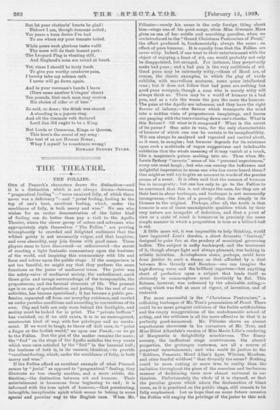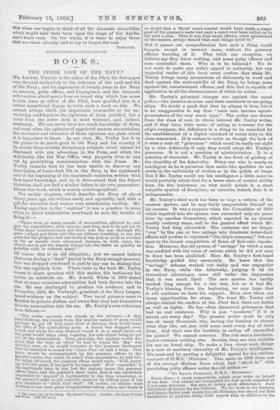THE THEATRE.
THE FOLLIES.
ONE of Peacock's characters draws the distinction—and it is a distinction which is not always drawn—between "pragmatical fooling "—" mere unmixed folly, of which there never was a deficiency "—and " jovial fooling, fooling to the top of one's bent, excellent fooling, which, under the semblance of folly, is both merry and wise." No one who wishes for an ocular demonstration of the latter kind of fooling can do better than pay a visit to the Apollo Theatre, where the clover group of actors and actresses who appropriately style themselves " The Follies " are proving triumphantly to crowded and delighted audiences that the wildest gaiety is not necessarily vulgar, and that laughter, and even absurdity, may join forces with good sense. These players seem to have discovered—or rediscovered—the secret of creating a light fantastic commentary upon the business of the world, and inspiring this commentary with life and form and colour upon the public stage. If the comparison is not too fanciful, we might say that they perform the same functions as the jester of mediaeval times. The jester was the safety-valve of mediaeval society, the embodiment, amid those grim and savage surroundings, of the irresponsible, the preposterous, and the farcical elements of life. The present age is an age of specialisation, and jesting, like the rest of our activities, has become specialised; it has become a public pro- fession, separated off from our everyday existence, and carried on under peculiar conditions and according to conventions of its own. Cap and bells are only worn behind the footlights, and motley must be looked for in print. The " private buffoon " has vanished, or, if he still exists, it is in an unrecognised, amateurish kind of way, with few privileges and no emolu- ment. If we want to laugh, to throw off dull care, to " point a finger at the foolish world," we open our Punch,—or we go to the Follies. But the gist of the matter remains the same; the " fool " on the stage of the Apollo satisfies the very wants which were once satisfied by the "fool" in the baronial hall; the business of both is, in its essence, identical,—to provide " excellent fooling, which, under the semblance of folly, is both merry and wise."
If the Follies afford an excellent example of what Peacock means by " jovial " as opposed to "pragmatical " fooling, they illustrate no less clearly another, and a more subtle, dis- tinction,---the distinction between wit and humour. Their entertainment is humorous from beginning to end; it is informed with the true spirit of humour,—that penetrating, intangible, inexplicable spirit which seems to belong in some special and peculiar way to the English raze. When Mr. Polissier—surely his name is the only foreign thing about him,—sings one of his quiet songs, when Miss Gwennie Mars gives us one of her subtle and searching parodies, when we are introduced to the " Grand Christmas Pantomime of Faust," the effect produced is, fundamentally, always the same : an effect of pure humour. It is equally true that the Follies are never witty. Indeed, if one went to their entertainment with the object of enjoying a feast of wit, one would probably not only be disappointed, but enraged. For instance, they perpetually make bad puns ; and a bad pun is the very antithesis of wit. Good puns may be extremely witty,—those of Hood are, of course, the classic examples, in which the play of words exhibits, with marvellous neatness, some queer intellectual crux ; but it does not follow that bad puns are nothing but good puns manques, though a man who is merely witty will always think so. There may be a world of humour in a bad pun, and as a rule the worse the pun the more the humour. The puns at the Apollo are infamous, and they have the right flavour of infamy,—the flavour which transports the mind into a sudden vista of preposterous imaginings, and leaves one gasping with the tears running down one's cheeks. What is this flavour? Of what is it composed.? What is the secret of its power P One asks in vain, for the only characteristic of humour of which one can be certain is its inexplicability. Wit can always be analysed and repeated and carried about, as it were, in samples ; but humour depends for its existence upon such a multitude of vague suggestions and indefinable subtleties that the whole meaning of it may vanish at a touch, like a magician's palace melting into air. Thus when Mr. Lewis Sydney "invents" some of his "personal experiences," every one must laugh ; but who can convey the ludicrous and delightful impression to some one who has never heard them P One might as well try to give an account in words of the precise aroma of a scent. It is often said that the essence of humour lies in incongruity ; but one bas only to go to the Follies to be convinced that this is not always the case, for they are at their best in sheer burlesque, and burlesque is not necessarily incongruous,—the fun of a parody often lies simply in its likeness to the original. Perhaps, after all, the truth is that humour is one of those unanalysable qualities which by their very nature are incapable of definition, and that a point of view or a state of mind is humorous in precisely the same simple manner in which a proposition is true or a billiard-ball is red.
A little more wit, it was impossible to help thinking, would have improved Love's Garden, a short dramatic "fantasy,." designed to poke fun at the prudery of municipal governing bodies. The subject is sadly hackneyed, and the treatment of it, though always light and always pleasant, was lacking in artistic intention. Aristophanes alone, perhaps, could have done justice to such a theme as that afforded by a duet between Mrs. Grundy and Bacchus—one can imagine the high-floWing verse and the brilliant repartees—but anything short of perfection upon a subject that lends itself so obviously to commonplace must inevitably be flat. This flatness, however, was redeemed by the admirable acting,---• acting which was full at once of vigour, of invention, and of restraint.
Far more successful is the "Christmas Pantomime," a rollicking burlesque of Mr. Tree's presentation of Faust. There could be no more pungent criticism of the feeble artificialities and the empty exaggerations of the melodramatic school of acting, and the criticism is all the more effective in that it is perfectly good-humoured. Mr. Pelissier shows an almost superhuman cleverness in his caricature of Mr. Tree, and Miss Ethel Allandale's version of Miss Marie Li:thee rendering of Marguerite is delightfully mischievous. The flimsy scenery, the ineffectual stage contrivances, the absurd properties, the grotesque costumes, are all a source of perpetual entertainment; and who could do justice to the " Soldiers, Peasants, Maud Allan's Apes, Witches, Hoodoos, and other fearful wildfowl " that diversify the scene ? Nothing could be more cutting or more true to reality than the imitation throughout the piece of the senseless and barbarous manner of declaiming verse now almost universal in our theatres. Unfortunately the whole of it is rhymed, so that the peculiar graces which adorn the declamation of blank verse, as it. is practised on the public stage, still remain to be fully emphasised. Let us hope that on some future occasion the Follies will employ the privilege of the jester to this end. But when one begins to think of all the dramatic absurdities which might take their turn upon the stage of the Apollo, one's brain reels. On the whole, it is wiser to enjoy those that are there already, and to try to forget the rest.
lawoTus.










































 Previous page
Previous page